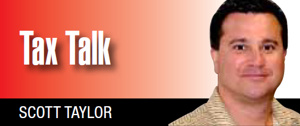You wear a lot of hats as an owner/operator. You're the boss and an employee, the business manager and the guy at the wheel, the chief cook and the bottle washer. As the big cog at your operation, you deserve your fair share of grease, if you know what I mean.
When you work for someone else, getting paid (and paying tax on your personal income) is pretty straightforward. Typically, every couple of weeks, you get a cheque minus an amount for taxes, CPP, and other deductions.
It's different when you're on your own. In addition to everything else you do, you also run the payroll department. It's up to you to make sure you're paying your taxes properly both as a corporation and as an individual.
Monthly remittances
For years, many incorporated owner/operators reported their "wage" as self-employment income on their tax return. By showing their income as self-employed on their T1, they paid all the correct tax and CPP as though they were on payroll.
Canada Revenue Agency doesn't like that. It wants you to pay a T4 wage to yourself and make remittances by the 15th of each month. While it may be beneficial to wait until your year-end accounting is complete to determine your actual drawings from the company and decide the best mix of wages and dividends, you still have to make reasonable monthly payments and ultimately match the amount on your T4.
CRA auditors are paying attention to inconsistencies. They look at active businesses reporting income on corporate tax returns that do not have any T4 summaries filed. If they audit your file, they can force you to issue T4s and charge you late-filing penalties and interest on overdue payments.
Auditors also scan personal tax returns with self-employment income. They can use your SIN to find a matching business number registration. If they don't see one, you're going to get a call or letter and they'll be especially interested in your GST/HST administration. Remember, if you have more than $30,000 gross self-employed income, your business must be registered.
CRA comes calling
We've had one call from CRA already checking on a 2012 filing. A client took out about $40,000 from his company, which we declared as wages when we filed his corporate year-end months ago.
We explained the need for him to make monthly remittances to CRA, but when we prepared his T4 summary we found that our client had made only two payments, enough to cover his CPP obligation on about $15,000 in wages.
After a long discussion, he told us to file his return without any changes, as he did not want to pay the full amount necessary to cover CPP on the $40,000 at that time. He wanted us to show the remaining $25,000 Paying yourself and the taxman of wages directly on his tax return.
CRA picked up on this and now wants to know why $40,000 in wages is not on his T4 summary. We're going to have to re-file, and the client is going to have to pay what he owes anyway.
Lots of folks seem to have it in their heads that paying CRA monthly is difficult. I realize that paying taxes isn't any fun, but in today's world how can it be a hassle? Simply set up CRA as a "bill" or "payee" and you can pay your personal and business tax through your bank's telephone or Internet banking service. You can also pay through a bank teller on or before the date your payment is due.
When you're incorporated, you may be the boss but you're still an employee with taxes to pay. Likewise, your company has its own distinct tax obligations to meet.
For an owner/operator, rarely does a decision about finances affect one but not the other. CRA is well aware of this, and you should be, too. Talk to your accountant about handling income tax payments correctly.
Tax deadline: April 30
Here's a note for everyone: The deadline for submitting your 2012 personal income tax return is April 30. If your return is late, there's a minimum 5% penalty on the balance owing, plus 1% per month for a maximum of 12 months. If you have filed late before, the penalties may be higher.
Even if you can't afford to pay the balance, filing the return on time can save you penalties and fees. You will also be in a better negotiating position with CRA regarding a payment plan. Filing late and missing payments sends a bad message.
If you need help preparing your return, see a qualified professional, preferably one who's familiar with trucking. Then, the day after you mail your return, tilt your world back into tax-planning mode. Talk to an accountant or business advisor about how to reduce your tax obligation in 2012 and beyond.
Scott Taylor is vice-president of TFS Group, providing accounting, bookkeeping, tax return preparation, and other business services for owner/operators.
Learn more at www.tfsgroup.com or call 800-461-5970.
